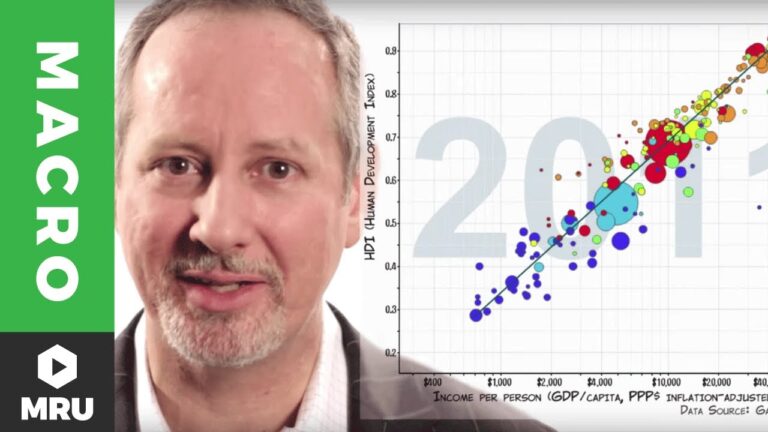They say what matters most in life are the things money can’t buy.
So far, we’ve been paying attention to a figure that’s intimately linked to the things money can buy. That figure is GDP, both nominal, and real. But before you write off GDP as strictly a measure of wealth, here’s something to think about.
Increases in real GDP per capita also correlate to improvements in those things money can’t buy.
Health. Happiness. Education.
What this means is, as real GDP per capita rises, a country also tends to get related benefits.
As the figure increases, people’s longevity tends to march upward along with it. Citizens tend to be better educated. Over time, growth in real GDP per capita also correlates to an increase in income for the country’s poorest citizens.
But before you think of GDP per capita as a panacea for measuring human progress, here’s a caveat.
GDP per capita, while useful, is not a perfect measure.
For example: GDP per capita is roughly the same in Nigeria, Pakistan, and Honduras. As such, you might think the three countries have about the same standard of living.
But, a much larger portion of Nigeria’s population lives on less than $2/day than the other two countries.
This isn’t a question of income, but of income distribution—a matter GDP per capita can’t fully address.
In a way, real GDP per capita is like a thermometer reading—it gives a quick look at temperature, but it doesn’t tell us everything.
It’s far from the end-all, be-all of measuring our state of well-being. Still, it’s worth understanding how GDP per capita correlates to many of the other things we care about: our health, our happiness, and our education.
So join us in this video, as we work to understand how GDP per capita helps us measure a country’s standard of living. As we said: it’s not a perfect measure, but it is a useful one.
Ask a question about the video:
Help us caption & translate this video!




25 Comments
these videos help me soooo muchhh thank youuu
perfect
All metrics have their issues, the question which needs to be asked is how accurate and how relevant that metric to what you wish to measure. GDP does a reasonable job providing those with the hands on the economic levers of a country to set to the optimum position. However using this value to determine your personal living standard, its not very useful. GDP per person provides a better view, however even in this case its best use to determine trend lines. If its going up, then life could be good. If its going down, time to tighten your belt. The biggest issue is this does not tell you how that economic activity is distributed, so its possible even if GDP PP is going up, most of the benefits may be only going to a small number of people. But at a high level it’s a good way of determine if an individual’s life is improving or declining. GDP Per person parity is an attempt to compare the living standards of one country with another. In principal it’s a reasonable metric, but it has a lot of issues in getting accurate data. So when looking at GDP PPP, make certain you are very careful. On the other hand when GDP per person is going up you know that in theory life should be getting better for any individual in your country, as long as its going up faster than inflation.
GDP is more to do with how much money is generated through the production of services and goods rather than personal wealth.
What he's saying about third world countries is true. But today, in 2025, among G7 nations, it's not true that we should focus on increasing GDP. That focus will not bring regular people out of relative poverty. Here and now, the problem is inequality. We need to focus on the rapidly increasing inequality between billionaires and the rest of us. In 2025, any increase in GDP (in the G7 countries) is just helping the ultra-rich. As struggles grow for the rest of us.
9 years later thank you still
Very clarifying , thank you
"Income is distributed differently," at 2:13, is not a very good explanation for the question "Why is income distributed differently?" thirty seconds earlier.
From Nigeria 🇳🇬 I love your lectures
Baby boomers and Gen Xers just don't get paying car loans, rent, and student loans at same time means having two jobs at one time… Made it in Charlotte on $16 an hour but also had excess overtime at the time…
Pros
Happiness , life expectancy , human development , etc positivelt correlate with real gdp —> as real gdp inc standard of living improves because when we have money we can afford the other good things in life
Cons
Real gdp doesnt show wealth/ income distribution –> two countries may have a similar real gdp ( avg income ) but one may have more poverty than the other
But as real gdp inc , income of both the rich and the poor increases
Mate this is a great video and explanation. Thanks!
What a helpful and straight-forward video! Highly reccomend.
Lewis Matthew Martin Steven Brown Shirley
Wonderful video highlighting both strengths and limitations of using Real GDP per capita to measure a country's standard of living. Clear explanation of concepts
I found traditional education so boring but your videos are easy to watch. The new generation grows up with TikTok. If those capitalists are going to exploit us with social media traps, they better be willing to find some new education methods as well!
Good video
man, you are a blessing to society. thank you so much for the video. one thing that i never quite understand is the term "economy health". how exactly do you determine the health of the economy, what is the parameters?
It would have been interesting to have the correlation of real GDP against Inequality-adjusted Human Development Index
Make higher education accessible to everyone and everywhere. Promote vocational programs through apprenticeship. Incentivize people to exercise and study/read more. Promote arts like music and dance.
This is really interesting! Thanks 🙏
A question I was making myself today was, if a country is underdeveloped in terms of infrastucture and technology, yet everyone, or the majority of people have access to food, water and a shelter, would that country still be considered rich? As oppose to a country that is technologically developed yet the average citizen barily gets their needs met, example having 1 meal per day and having to share a shelter with serveral people.
Thank you!❤
last point is very nuance and people miss it that even tho growth in income inequal country deacrease poverty
Very good presentation. Really a good one.